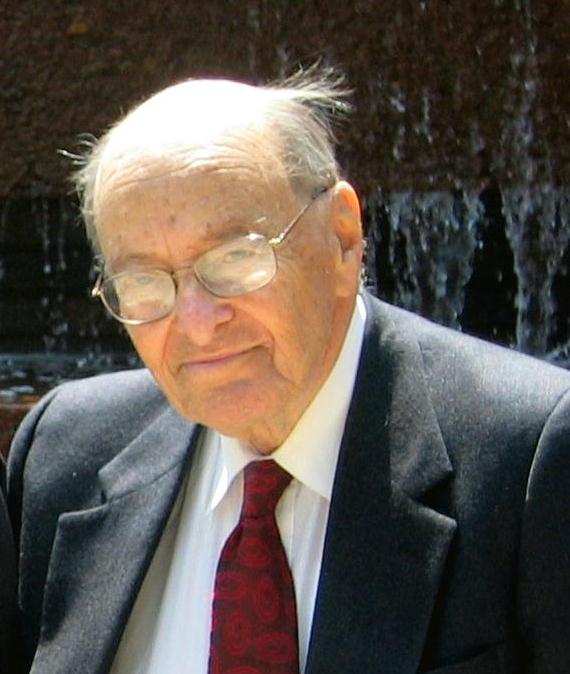Rudolf H. Hertz, a longtime Roslyn Heights resident who fled Nazi Germany, landed on Normandy Beach on D-Day with the U.S. Army and later became a bank executive, died last week of a heart attack at 94.
Hertz’s son, Michael, a deputy assistant attorney general with the U.S. Justice Department, said his father was always friendly and carried a sense of humor.
“He had a very good sense of humor and liked to tell jokes especially when he was younger,” Hertz said. “He almost always had a joke for people when he saw them. He was also incredibly proud of his family history and discussed that a lot.”
Rudolf Hertz, who in his later years lived in Floral Park, left Germany in 1933 for the United States when his father, a prominent physics professor, lost his job after Jewish civil servants were banned from government work.
Hertz was drafted by the army in May 1941, and assigned to the 56th Signal Battalion. He landed on Normandy Beach on D-Day, June 6th 1944. He went on to earn the rank of master sergeant and recalled the day in a memoir he had written.
“He began moving towards the shore when the boat was hit by a German 88 shell,” he wrote in the memoir. “One soldier was killed A few moments later the boat hit a sandbar and we heard the captain yell everybody swim ashore.. this is it…”
“And there I was…the next thing I knew I was swimming and thrashing through the fairly warm water towards the shore of France while the hot air of the screaming 88 shells was all around me,” the memoir continued.” Finally I climbed up on the beach when I saw the terrible mess all around me. The entire beach head was no more than one or two hundred yards wide. The only heavy weapons were four or five machine guns which a few exhausted soldiers were rushing from one end of the beach to the other while shooting off a few rounds. I could see no enemies but all around me was the putrid smell of the German 88 shells. Of course my carbine was soaked with water but that was no problem; there were plenty of empty carbines lying all around me. There were more American soldiers lying dead around me…”
Hertz would go on to win the bronze star for his service at the battle. His unit continued in the March across Europe and participated in the liberation of Paris in August 1944. He also took part in the liberation of his hometown Goettingen and Buchenwald.
Hertz worked for 60 years at Merchants Bank in Manhattan, starting at an entry-level position at the age of 19 after leaving Germany. From 1979 to 1985 he held the position of bank president. He then served as vice chairmen until 2000, when Merchants merged with Valley National Bank of New Jersey, where he remained as a consultant.
Friend and former co-worker Ralph Italie said that Hertz was both a family man and a great banker. Italie had worked with Hertz for 25 years and continued to be friends for more than 60 years. Hertz was his wife’s second cousin.
“He was very devoted to his family, the bank and he was very devoted to his parents,” Italie said. “I couldn’t say a bad word about him. He was a very fine banker and very risk averse, more than most people. We all miss him.”
Born in 1917 in Goettingen, Germany, Hertz immigrated to America in 1936, starting work at Merchants.
After the war Hertz returned to the bank and met his wife Margaret, who his son Michael said, shared his love for opera. They were married for 55 years until she died in 2002. For 45 of those years, they lived in Roslyn Heights.
Hertz’s son said his father enjoyed collecting rare books, which was something he did in honor of his own father who shared the same interest, but lost most of his collection during World War II. Hertz also followed his families own work.
“He was very interested in collecting old books, all the way back to the 15th century,” Hertz said. “Even though he wasn’t trained as physicist, he wanted to learn all about his father’s work. His father professor Paul Hertz had numerous correspondences with Albert Einstein and its said may have helped him with the theory of relativity.”
Hertz’s son recalls how deeply leaving Germany affected his father.
“He had a good friend he went to high school with who wasn’t Jewish and didn’t leave Germany,” Hertz said. “Every time he went back to visit Europe he would not go into Germany at all and made his friend leave every time to visit him. After decades of refusing to step foot in Germany, his friend invited him to a house he built in the Bavarian Alps, and my father finally visited.”
Hertz is also survived by his daughter, Shelley Hertz Kempner, his daughter in law, Ronnie L. Edelman and his son in law Robert Kempner. He is also survived by four grandchildren, Rachel Hertz, Jonathan Hertz, Jeremy Kempner and Daniel Kempner.
Services will be held at a later date at Arlington National cemetery.
Reach reporter Timothy Meyer by e-mail at meyerj.tim@gmail.com.



